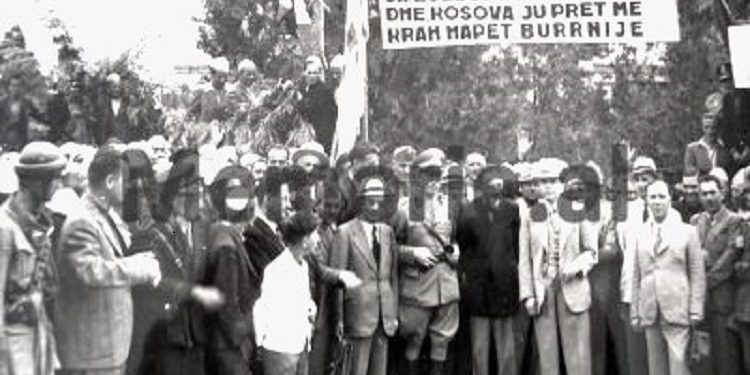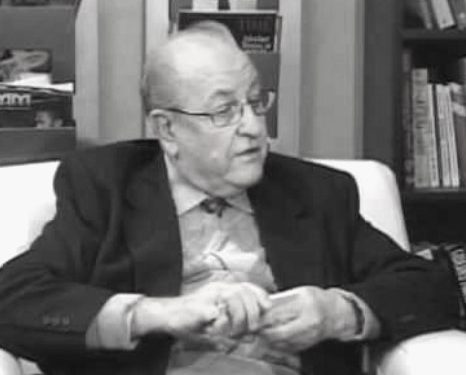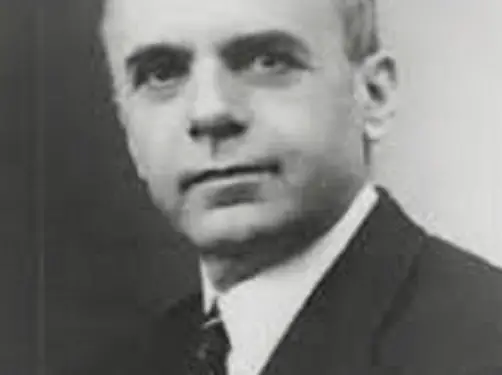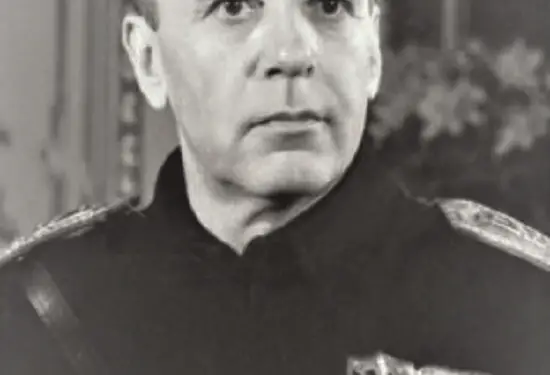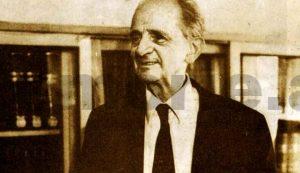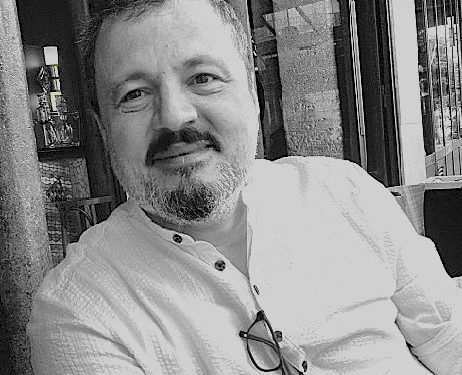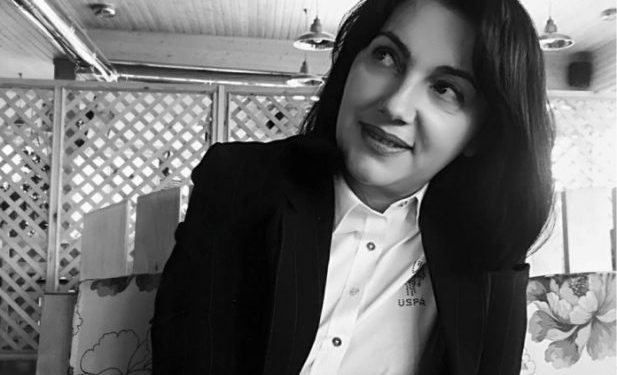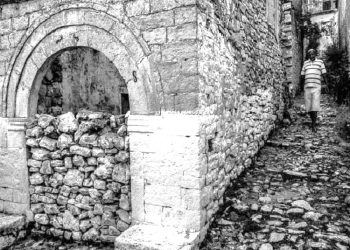Part Two
Memorie.al / The official initiative to rewrite the history of our nation based on documents and facts, it is clear, was bound to arouse great general interest. This, in principle. However, behind every such circumstance and initiative, the obstacles are so numerous and varied that often they remain just initiatives. But what about the hopes they instill in people? They remain just unrealized dreams! We shall now narrow the circle of considerations. Again, in principle, when speaking of a revision of written history, which especially during the period of the dictatorship was deformed, mutilated, and disfigured on one side, while it was inflated with completely untrue data on the other, and was also school nourishment for entire generations, it is quite clear that the burden should have fallen on the historians, who with the greatest will and honesty, should face this duty of national honor and carry the work forward. However, the bitter reality is completely different!
Continued from the previous issue
The young linguist, Ms. Ledi Shamku Shkreli, now defines the figure of Mustafa Merlika Kruja: “Perhaps indeed the figure of Mustafa Kruja or Merlika, as we have often heard in the past, is connected with his supportive role towards Mussolini’s Italy. This period of Kruja’s life, strongly fueled by communist propaganda, cast an unreasonable shadow over the entire moral and material work of this Albanian personality.”
And she further affirms: “As Prime Minister of the country, he committed to highlighting Albanian identity under the Italian crown and, among other things, founded the Institute of Albanian Studies, transforming it into an important pole of Albanological studies.” When Ms. Ledi Shamku is asked whether Mustafa Kruja’s work should be translated into the Albanian language, she answers firmly and competently that; not only Kruja, but neither Fishta nor Camaj, should be thought of as needing translation.
The researcher calls the incomprehension of their language a deficiency of our school system and formulates these convictions: “What I insist on is that Albanian speakers vitally need to acquire a broad linguistic culture in school. It is a shame for our school, for our philology, for our linguistics, to still deny today, under conditions of a profound democratization of life, entire parts of our national consciousness, where language, as is known, plays a primary role for us.”
I read these statements by the researcher and my subconscious is heavily struck. Yes, it is truly heavily struck and my conscience bothers me. Some time ago I read an article with the meaningless title “Recycling History” (Riciklimi i Historisë) by the linguist Ardian Vehbiu. The initial impulse was to sit down and do an analysis of his writing.
However, based on the fact that some time ago, I had criticized him about an article during which he threw out ideas, calling the Albanian Highlands (Malësia) a gangrene of the country, (?) and my attempt to find the end of the thread of that psychologically tangled mess, which is the brain of Mr. Ardian Vehbiu, I found it in his fixed idea… don’t ask me why, I don’t like Fishta… when his image (of the Highlands – M.K.) is not slandered from the yellowed pages of the poems… Highlanders as the proud embodiment of Fishta’s heroes… as a poet, Fishta honestly bores me.
Or when it is mentioned how Prof. Eqrem Çabej had publicly stated that… “The Highland Lute (Lahuta e Malësisë) is a complete, perfect, and excellent work of art in itself,” Mr. A. Vehbiu states… “aesthetically, Çabej’s clock had also stopped in the romantic Vienna of the 20th century…”, I avoided a confrontation with Mr. Vehbiu.
However, the rationality of Ms. Shamku’s logic, also twinned with her scientific honesty, by burdening herself as a linguist and researcher of Albanian with shame, for the denial that is still done today to entire parts of the national consciousness, where language plays a primary role, made me feel ashamed myself, that I avoided the obligation to publicly state, once again, how disappointed I felt by the writing of Mr. A. Vehbiu, who does not position himself to correct the past distortions.
Here then, quite briefly, are the two most essential features of the linguist A. Vehbiu’s writing:
1- The use of foreign words, only to make an impression on the next reader.
2- The introduction of some concepts, which in my opinion are extremely misguided.
Regarding the first point, I list some sentence fragments starting from the title of the article “Recycled History” (Historia e Ricikluar). In none of the Albanian language dictionaries, neither that of the group of authors nor that of M. Elezi, could I find the meaning of the term “recycled” (ricikluar)! “… The role of historical vision in increasing society’s cohesion…”
“… Cultural literacy and which is related to that historical knowledge that today’s Albanians know and read more or less alike…” (Why not call it a cultural octave, or a sequence of real cultural numbers, because the alphabet of the written language coincides with the musical octave or, with the sequence of real mathematical numbers, according to the respective field).
“… Their explicit mission…”! “… slightly controversial figures, like Skanderbeg…” (Since it is borrowed from Italian, the original term is “controversial” – kontroversiale). “… In this multitude of interpretations and extrapolations…”! “… In the name of some mythical etatism…”!
While Ms. L. Shamku feels guilty for the shortcomings in the Albanian language curriculum in schools, her colleague, Mr. A. Vehbiu, uses a language… that is not Albanian at all. Two words now also regarding the concepts introduced by Mr. Vehbiu.
At a time when all four linguists analyzed previously, such as Prof. Eqerem Çabej and also Ms. Shamku, along with Messrs. Mehmet Elezi and Shaban Sinani, are examples to be followed regarding their extremely clear and balanced positions toward historical facts and truths, it is regrettable that in Mr. A. Vehbiu, we see a mentality that shows a lack of clarity in judgment.
I will only bring a few examples, (but this time his full expression and not fragmented as above), where our objective was only the selection of the barbarisms used by him.
“However, both the Renaissance and communism were programmatic movements, which should be judged not only by their explicit mission, but also by the amputations they made to national history; not to mention the falsifications.”
In principle, Mr. Vehbiu presents himself as an impartial judge, proposing the need for objective judgment of both the ‘Renaissance Movement’ and the ‘Communist Dictatorship’ based on their clearly outlined missions. But, subsequently, he visibly instills doubt in the reader about the Renaissance figures, not only as mutilators of history, but also as its falsifiers, on par with the communists. All of this, viewed in connection with how he treats the figure of Skanderbeg, is truly disheartening.
He initially speaks of how the Renaissance gave Albanians the history that would consolidate their national consciousness. As for communism, he states that it emphasized the historical metaphor, which presented Albanians as a proletarian nation. And then he continues with the affirmation: “Some narrative, like that of Skanderbeg, suited both paradigms beautifully.” In this statement, the term narrative itself is not found in any of the major Albanian language dictionaries, with a total of 82,000 words.
But on the other hand, by using this vague term for the average reader, (who perhaps doesn’t even stop to research it further), Mr. Vehbiu, perhaps not even with malice, but from the lack of knowledge of the true meaning of the term, calls the histories written about Skanderbeg, tales fabricated by the imagination of their writer. And I raise the question: Who does this definition of the history of our National Hero Skanderbeg serve?
Furthermore, Mr. Vehbiu continues with a clear and, for him, final affirmation: “There is also a nationalist current that seeks to rehabilitate the so-called ‘quisling’ rulers, despite the fact that they openly collaborated with the Italians, respectively the Germans.”
Precisely this positioning of Mr. Vehbiu, as a descendant of his Marxist-Leninist teachers, who even today from the heights of the 2000s, cannot judge in an un-indoctrinated way and detach himself from them, fills me with even greater respect for the researcher Ledi Shamku. Mr. Vehbiu cannot get out of the bunker where he is installed.
Not the work of Mustafa Merlika Kruja “An Analytical Study – What Frangu i Bardhë teaches us with his dictionary,” nor the other work “Mustafa Kruja’s Correspondence with Father Paulin Margjokaj,” (11 years of reciprocal correspondence that I would call a truly monumental work), and certainly not the other work by the same author “Historical Anthology,” can move this researcher from his trench! And this is also the great misfortune of our nation: even the generation of A. Vehbiu cannot detach themselves from the dictatorial past and cannot speak their word with the weight of justice.
In closing the article, Mr. Vehbiu also gives the final major directive: “The revision of history, more than ‘correcting the mistakes’ that was made in the past, should serve to correct the mistakes that, otherwise, we will not be able to avoid in the future.”
Regarding this last statement by Mr. Vehbiu, anything I say is too little. When the Italian journalist, one of the most distinguished of the last half-century, Indro Montanelli, was asked how he had changed his political views and no longer actively supported the socialists, he had answered: “Col passare del tempo, solo gli idioti non cambiano vedute e punti di vista” (With the passing of time, only idiots do not change perspectives and points of view).
After addressing the points that hurt me from Mr. Vehbiu’s writing, (feeling relieved from the pangs of conscience, as if I had passed over his writing in silence), and affirming that I sincerely regret that for a specialized linguist like him, not only the form of the writing in this specific case leaves much to be desired, let alone the content, I return to the statements and positions of Ms. Shamku.
This researcher, as soon as she is confronted with a study, (of a person whom she was inspired by, if not for the bad, but by no means for the good), and sees in his rational method of linguistic analysis that he places the comparison of spoken language with the written one at the foundation of his research, to continue with his conclusions, she stops and judges. Before her eyes, the philosophers of modern linguistics pass in their entire chronological span. She recognizes the great Derrida, who is considered a pioneer in this direction, as the cornerstone of this method.
However, the researcher, on the other hand, has before her eyes and reads in Mustafa Merlika’s manuscript how the latter, several decades before Derrida, was analyzing Frang Bardhi’s dictionary with the same analytical method. Ms. Shamku affirms that; “… the path and method that he (M. Kruja – M.K.) followed, led to approximate and often more effective conclusions than those which deconstructionists would reach in the ’70s, spread, for example, with programmatic texts like ‘L’écriture et la différence‘.”
Her surprise undoubtedly fills the linguist with joy, with great joy and why not, even with pride: it is not a matter of honoring Mustafa Kruja in this way. The researcher clearly sees that bringing out the comparative method used in the analysis of Frang Bardhi’s dictionary pulls the researcher Mustafa Kruja out of the darkness where Mr. A. Vehbiu and his associates still want to leave him to this day, (by giving directives on how unimportant the revision of past history is), and truly belatedly, but the cultivator of the Albanian language is finally given the honor, as well as the place he deserves, and alongside him, his work gives honor, truly belatedly, to our national linguistics!
I will conclude this analysis by referring to the title I gave the article. Fate would have it that in the early years of the 21st century, a researcher named Ledi Shamku-Shkreli was confronted with one of Mustafa Merlika Kruja’s studies. Had this fortunate event not occurred, (as the researcher herself expresses), three more centuries could have passed… and another researcher, Ledi Shamku, might have stumbled upon some pages from Mustafa Merlika Kruja’s study and the lost pages… would never be investigated again.
Who would be considered the loser in this case? Mustafa Merlika Kruja or, Our National Linguistics? Precisely, based on these considerations, and starting from the fact that the ice has now been broken and the personality Kruja can no longer be kept hidden in the so-called forbidden funds of the State Archive, I think and wholeheartedly wish that the researcher Ms. Ledi Shamku Shkreli will become the igniting spark of the chain reaction of bringing out of the darkness of the forbidden archive funds the personalities of our nation, as well as their works!
Thus, those malevolent “taboos” that the dictatorship erected against the entire category of those who have been the honor of our Nation will be broken! Researchers will certainly be given the honor they deserve. Those condemned to oblivion until yesterday, along with their works, will undoubtedly be honored. But the greatest honor will be received by the Culture of the Albanian Nation!
It is an undeniable fact that Kosovo held a special place in his views as a thinker and politician. This is shown by a series of testimonies, including a letter written by him, a year before he died. In his correspondence with the Franciscan priest Paulin Margjokaj, he wrote: “…even today if you ask me, do I want independent Albania, without Kosovo, or under a protectorate, but with Kosovo together, I would choose this second option.” / Memorie.al




